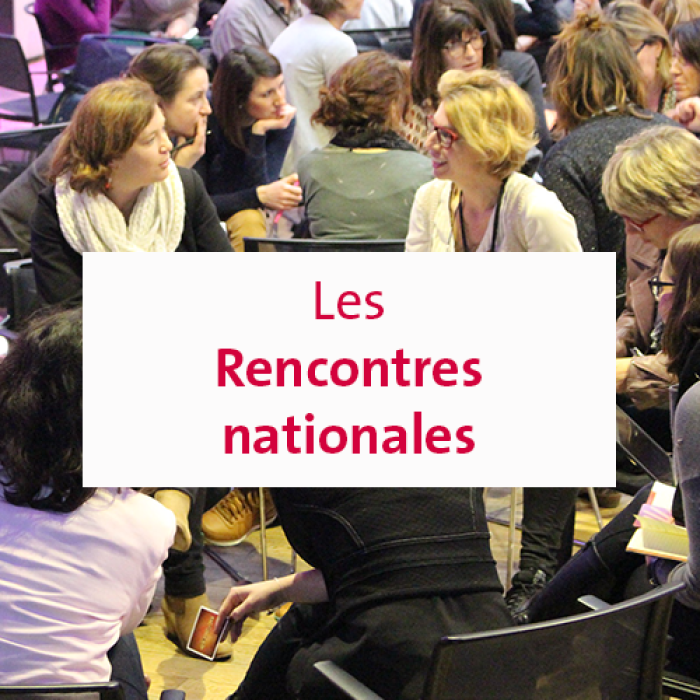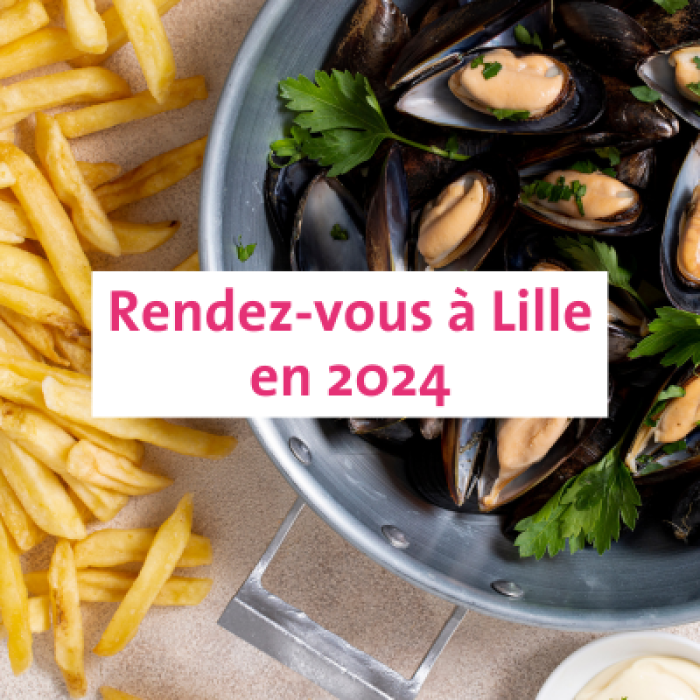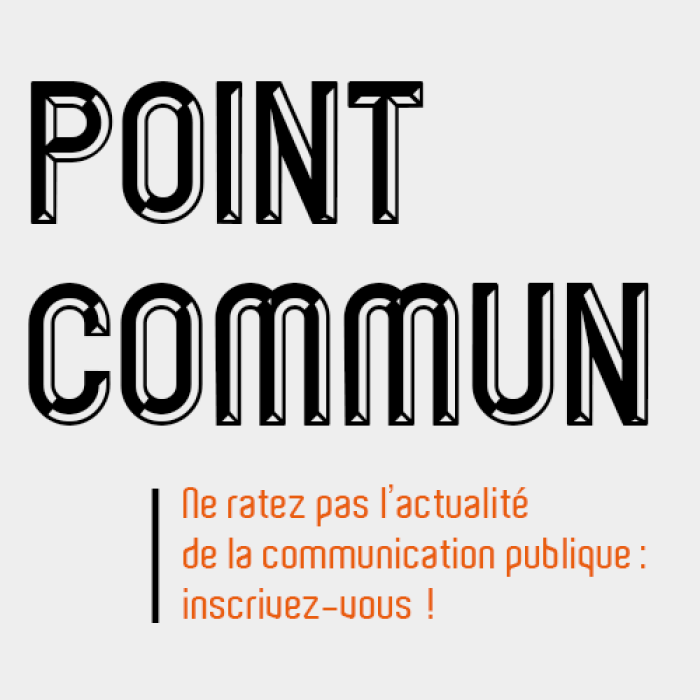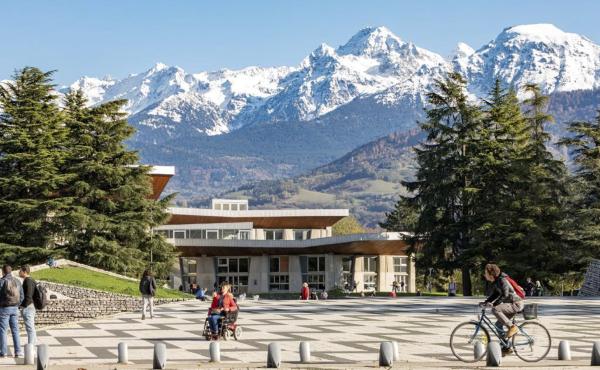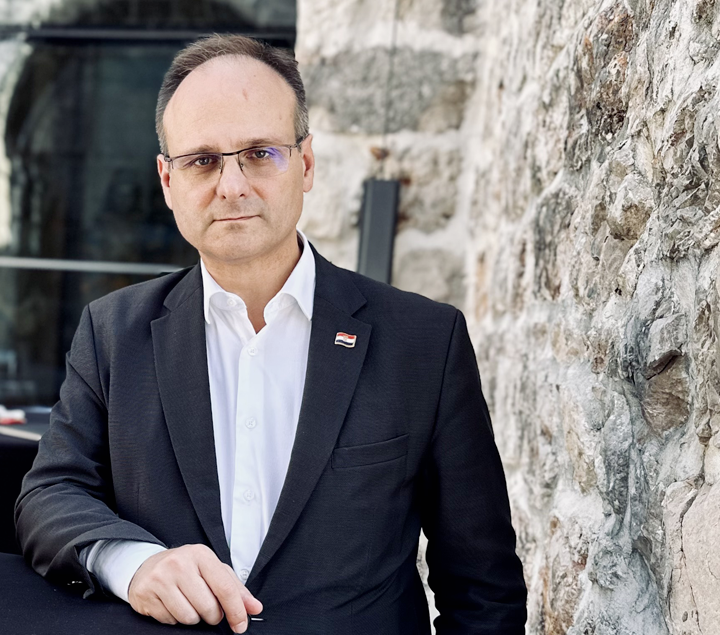
In Zagreb, communication is a vital issue
Croatia is now a member of the EU, but it still remembers lost dialogue and the voice of war. At a recent symposium of European communicators in Dubrovnik, it was interesting to talk to Zvonimir Frka-Petešić, Chief of Staff to the Prime Minister of Croatia, about the fragile power of dialogue and the virtues of public communication in the face of the political and climatic challenges that lie ahead.
Incommunication on the agenda in Dubrovnik
At the core of a country that gained independence at the end of the long and bloody war that marked the demise of the former Yugoslavia, the question of the breakdown or maintenance of dialoguein a communication climate of tension and the notion of incommunication so dear to Dominique Wolton was raised at a seminar on the enlargement of the European Union and the EU's macro-regional strategies (in Dubrovnik - Croatia) last September. We were reminded that “communication carries the risk of incommunication: the shared feeling of not being able to understand each other (dissatisfaction) or the belief that we have succeeded in understanding each other when we have not (misunderstanding). But this is neither non-communication nor disagreement, but rather negotiation.” The French researcher takes this even further, arguing that incommunication is a state of permanent dialogue that is a huge success for Europe.
Commonality: Does public communication have a role to play in the success of democratic consensus?
Zvonimir Frka-Petešić: It's extremely important! Kant taught us that the only reality that is accessible to us is our perception of that reality. So everything we do has to be explained, so that public opinion understands it and supports it. This is the very least we owe our citizens, who are sovereign in a democracy.
I often remind myself that democracy is not the governance of the strongest, the most responsible, the richest, or any other quality. No, democracy is first and foremost the governance of the majority. To put it another way, if we want to combine quantity and quality, so that this governance of the majority bases its decisions on informed, sound and critical judgement, citizens need to be as informed as possible. We have an obligation to advise them as best we can about government action and the issues at stake, or else we put ourselves in a position where democracy itself may be threatened (in other words, the situation becomes problematic if the majority of citizens are ill-informed). This is a sine qua non condition, because in situations of destabilisation and jeopardy, an overly emotional reaction on the part of the majority of voters can lead to ill-considered decisions. And there's no need to go back to the 1930s or the rise of the extremists in Europe. The French will no doubt remember the case of Paul Voise, the old man who was attacked, beaten up and had his house burnt down, and whose battered face shocked France just a few days before the first round of the 2002 presidential election, which resulted in the surprise defeat of Lionel Jospin by Jean-Marie Le Pen. Afterwards, the television channels admitted that they had made a mistake and focused too much attention to this tragic news item, which aroused excessive emotion, instead of presenting a more objective, measured and quantified picture of insecurity in France. There is no shortage of similar examples...
Populism, which misuses and abuses the register of emotion, is the death-knell of democracies.
In the image-based society that gives pride of place to emotion, it can play a disproportionate role in democratic decision-making, with dramatic political consequences. This is why populism, which misuses and abuses the register of emotion, is the death-knell of democracies, because it is based not on objective advice but on knee-jerk reactions that preclude rational analysis. Unencumbered by the nuances that are the prerogative of all enlightened reasoning, populism oversimplifies everything and seeks to turn democracy into a dictatorship of the emotions of the majority. Its simplistic and unfortunately effective cookie-cutter communication is currently the greatest challenge facing democracies, particularly in Europe. If we only believed our senses and our eyes, simply observing the path of the Sun in the sky or looking out to sea from the coast, we would be convinced, as our ancestors were, that it is the Sun that revolves around the Earth and that the Earth is flat. But fortunately, humans are also endowed with reason, which, through the development of science, has enabled us to overcome the illusion perceived by our senses and emotions and to achieve so much progress, and today we know that the Earth is round and that it is the Earth that revolves around the Sun. So you could say that populism is to democracy what the myth of the flat Earth is to science.
Commonality: How can we gain credibility in order to be more effectively heard?
Zvonimir Frka-Petešić: This is very difficult, of course, because a government, even a local government, is a political body. And it's fair to say that governments are always a little subjective when it comes to judging their actions. So the key thing is to communicate its results based on irreproachable statistics produced by independent bodies, in other words neutral, measurable, indisputable indicators. This means we can avoid bias, suspicion and debate, as well as impressions and opinions, and stick to facts and objective realities. The independent press has a central role to play. We can well imagine that the danger for any government is to lack objectivity with regard to its actions. But the opposite danger - which is just as serious - is that some members of the press think that their objectivity can only be measured by how critical they are of government action. This could amount to partisan posturing, which undermines the credibility of the press and is damaging to democracy. The enlightened opinion of citizens in a democracy is as much threatened by outrageous eulogies of the government as by the fear of any praise when it is justified, because both have in common a guilty reluctance to deal with objective facts.
Commonality: What have been the Croatian government's recent communication initiatives?
Zvonimir Frka-Petešić: During the pandemic, we ran public campaigns on the importance of vaccination, which was nothing original, but nothing less. And we found that, despite all the efforts made, there was a certain section of the population that remained reluctant to be vaccinated, very inclined to take at face value the less than reliable information, rumours and opinions spread on social networks. This begs the question, because thirty years ago, 90% of sources of information were reliable, including books (from publishers, reading committees)and press outlets (from editorial staff who put themselves on the line). By some estimates, the amount of news generated around the world in the last 48 hours alone exceeds the amount produced by human beings from the dawn of mankind until 2003! More than 99.9% of this news is now digital, and we are faced with nearly seven billion would-be editors-in-chief with a smartphone. Anyone can publish anything with an instant global audience. In this ocean of trivia, the great challenge for tomorrow's citizens is to find their way to reliable information, the proportion of which is shrinking day by day, and on which they can base an informed opinion. This is also our great challenge, involving democratic representation and public communications. Populists, on the other hand, navigate very effectively on this ocean, which is more like a giant swamp.
Commonality: The challenges seem colossal!
Zvonimir Frka-Petešić: Yes, and to come back to vaccination, mankind was faced with a choice that could not have been simpler: “If you get the jab, you can avoid it; if you don't, you expose yourself to complications”. Despite this binary choice, in the European Union, where the level of education is not the lowest in the world, and despite the considerable resources invested in public communication campaigns, between 10% and 30% of citizens proved reluctant to get the vaccination. And this despite the fact that vaccination is one of the public health measures that has saved the most human lives in history.
The challenge is simply staggering, and we’re facing the greatest crisis humanity has ever known!
If we put this into perspective with the climate crisis and the energy crisis - both of which are extremely complex and technical processes whose parameters are far from binary - the difficulty of explaining what is at stake to a largely non-scientific public is enormous. The challenge is simply staggering, and we’re facing the greatest crisis humanity has ever known! Tackling the climate crisis by reducing greenhouse gases is not something that depends solely on the goodwill of governments, who could wave a magic wand and solve the problem while we do nothing to change our individual behaviour. This is thermodynamically impossible. The scale of the challenge is such that the response cannot be limited to action by any government. It necessarily involves changing our lifestyles, making choices, weighing up what is desirable against what is possible, in a world of shrinking energy resources. The head of the International Energy Agency has admitted that the world will reach a triple peak in the production of fossil fuels - coal, oil and gas - before the end of the decade, bearing in mind that they provide 80% of our energy. Despite the hoped-for acceleration in the deployment of renewable energies, on account of their intermittent and diffuse nature, they will unfortunately not be able to compensate for the expected reduction in the production of fossil fuels, whose only advantage, albeit a significant one, is that they are much more concentrated.
Commonality: These issues seem very, if not too, complex.
Zvonimir Frka-Petešić: That's why it's crucial that the press devotes much more attention to them, because alongside politicians who are often perceived as partisan, journalists have an important role to play in enlightening public opinion about the challenges facing our societies in the decades ahead. The international scientific community is unanimous, but scientists are not always good communicators. Their rigour often leads them to use precautionary language that is often misinterpreted as minimising the actual risks. Hence the growing importance of the role of science journalists in informing the general public. In democracies, the beginning of the answer will come when voters start to realise that the crisis is requiring us all to change our behaviour, that we need to move not only towards greater efficiency but also towards energy sobriety. In other words, when voters make the courageous, informed and deliberate choice of politicians and elected representatives who will speak the truth to them, even if it means offering them, Churchill-style, “sweat and tears”, because that’s the price of victory.
Commonality: How do we go about it?
Zvonimir Frka-Petešić: That's precisely the challenge. We need to set an example and make this a key issue. As far as the Croatian government is concerned, we have made the ecological transition one of our priorities, alongside education, demographic renewal and the digital transition. There has never been so much talk about renewable energies, decarbonisation, the fight against climate change, biodiversity, energy efficiency and thermal renovation of housing! The Prime Minister and all the ministers are on board. There has hardly been a speech in the last seven years (we’re in our second term) that hasn't touched on this subject.
And with the recent acceleration in extreme weather events, floods, forest fires and unprecedented storms, the issue has taken on greater importance in recent years.
Commonality: Faced with these challenges, and these misunderstandings, we now talk about incommunication as a working and action space for public communication, a field of controversy and confrontation. It's a situation with which Croatia is very familiar, isn't it?
Zvonimir Frka-Petešić: I don't think you can compare the situation in France and what happened in Croatia: they are completely different things. I know France well, I grew up in Paris and the Paris suburbs and I have dual Croatian and French nationality. So I know about life both in the northern suburbs of Paris and in the well-heeled areas of the 16th district.
And it's true that French society is increasingly polarised between communities that no longer understand or speak to each other, that ignore each other, which breeds resentment and fear. As such, we can certainly speak of a lack of understanding, confrontation or controversy, but despite the eruptions of violence we have seen in the suburbs, this in no way resembles the nature of an armed conflict like the one Croatia faced in 1991, even though it all started as a political dispute.

The disinformation of the 1990s
In the aftermath of the fall of the Berlin Wall, the governments of the various republics of the Yugoslav federation took very different views of the democratic wave sweeping through Central Europe. While the Slovenian and Croatian officers allowed free elections to be held, which led to the establishment of non-communist governments, Serbia was ruled by Slobodan Milošević, a communist leader who had converted to nationalism. Milošević's dream was to unite all Serbian minorities, willingly or by force, within a Greater Serbia, carved out of the remains of Yugoslavia, and to expel all other peoples. In 1989, in his speech to mark the 600th anniversary of the battle of Kosovo in front of a million Serbs, he promised that “new battles await the Serbs” and guaranteed them “the right to live together in a single state”. However, the Slovenian and Croatian leaders pretended to ignore the evidence and in good faith proposed converting the Yugoslav federation into a confederation, seeing this as an additional warranty against the growing hegemony of the master of Belgrade. Milošević refused, of course, and through a coup d'état in which he seized control of four of the eight federated entities within the federal presidency, he sought to bring the other four republics to heel: Slovenia, Croatia, Bosnia-Herzegovina and Macedonia. In response, this strengthened pro-independence and democratic sentiment, which was later expressed in referendums on independence. Milošević's Serbia, which had then taken control of the Yugoslav army, purged of its non-Serb officers and won over to its cause, responded with a conventional armed attack. However, it was deliberately qualified as a "civil war" by Belgrade's propaganda, in order to conceal its character as a war of territorial conquest and to deflect responsibility from the Serbian leaders.
Propaganda similar to that used in Ukraine
Like the recent Russian propaganda against the Ukrainians, the Croats were also described as Nazis. Just as the Ukrainian nation was denied by the Kremlin, so the very existence of the Croatian nation was called into question by Belgrade. This three-stage military aggression began with the short war in Slovenia, then continued in Croatia, where a quarter of the country was occupied from 1991 to 1995, and continued into Bosnia-Herzegovina (1992-1995), where more than 70% of the area was occupied. Just as the Ukrainian city of Marioupol was besieged and shelled for 86 days, the Croatian town of Vukovar held out for 87 days, flattened by bombs, and in 1991 became the first town in Europe to be razed to the ground after the Second World War. Similarly, Dubrovnik, the jewel of the Adriatic, was bombed and besieged for eight months before being liberated. As in Ukraine today, where the Kremlin claims to be coming to the rescue of the Russian minority, so in Croatia and Bosnia-Herzegovina, part of the Serb minority was instrumentalised by Belgrade's poisonous and hateful propaganda. It deliberately stoked their fears by portraying the prospect of becoming a national minority in the new independent and democratic republics as an unbearable possibility against which they could only take up arms. Some of the Serbs in Croatia and Bosnia-Herzegovina were then recruited to serve Milošević's Greater Serbia project, with the support of the "Yugoslav" army, which had by then become entirely Serbian. Finally, after four years of preparation to equip and set up the new Croatian army, the Croatian counter-offensive in the summer of 1995 liberated most of the occupied areas in Croatia in four days and, in the following weeks, half of the occupied areas in Bosnia-Herzegovina. This sudden shift in the balance of power eventually forced the Serbian leader to agree to negotiate a peace agreement with the Croatian and Bosnian presidents in Dayton, under the auspices of the United States. This was signed at the Élysée Palace in December 1995. This marked the end of the war and the peaceful reintegration of all the occupied areas of Croatia. However, four years later, in 1999, the Serbian president launched a new war of aggression, this time in Kosovo, provoking a Western military response that resulted in Serbia's capitulation and Milošević's extradition to the International Criminal Tribunal for the former Yugoslavia, where he was charged with crimes against humanity and genocide. He died before the end of his trial.
Being a member of a national minority and a fully-fledged Croatian citizen
Croatia has now been a member of NATO since 2009 and the European Union since 2013, and many Serbs who fled Croatia at the time of the Croatian reconquest have decided to return home. As belated proof that it is possible to be both a member of a national minority and a fully-fledged Croatian citizen – “and that Croatia was attacked for nothing” added Zvonimir Frka-Petešić, – the Serbs are now represented by three deputies in the Croatian Parliament, out of the eight reserved for national minorities (out of a total of 151). Moreover, all eight are part of the parliamentary majority and fully support the policies of the current government. Prime Minister Andrej Plenković, president of the Croatian Democratic Union (HDZ, centre-right), is convinced that their participation in the parliamentary majority is the best way to build Croatia as a State that makes its diversity its strength, and the best way to ensure that all citizens, whatever their origin, feel represented, respected, integrated and equal before the law.
In contrast to the years of war, when Serbs in the occupied areas took orders from Belgrade and advocated separatism, the Serb community in Croatia is now entering democratic life through its legitimate representatives in Croatian institutions. While Serbia is neither a member of NATO nor the EU, and the current Serbian government remains close to Moscow, representatives of the Serbian community in Croatia support the Croatian government's policy of political and military support for Ukraine. This is an important development which reflects the political emancipation from Belgrade of the Serbian community in Croatia and, at the same time, strengthens its political legitimacy in Croatia.
Anja Šimpraga, the Deputy Prime Minister, who comes from the Serbian minority, perfectly symbolises the process of integration and reconciliation that Croatia has accomplished since the war. She was eight years old in 1995, when the Croatian army liberated the areas occupied by the Serbs, and she and her family, along with tens of thousands of other Serbian civilians, fled Croatia and found refuge in Serbia. Four years later, she returned to Croatia with her family, completed her studies, became a local councillor and is now a member of the government, where her Croatian colleagues include veterans of the war of independence...
Croatia, a member of the euro zone and the Schengen area since 2023 and the world's 18th tourist destination, is now a nation that is forging ahead in all its diversity and cultural richness, but without denying its recent history.

